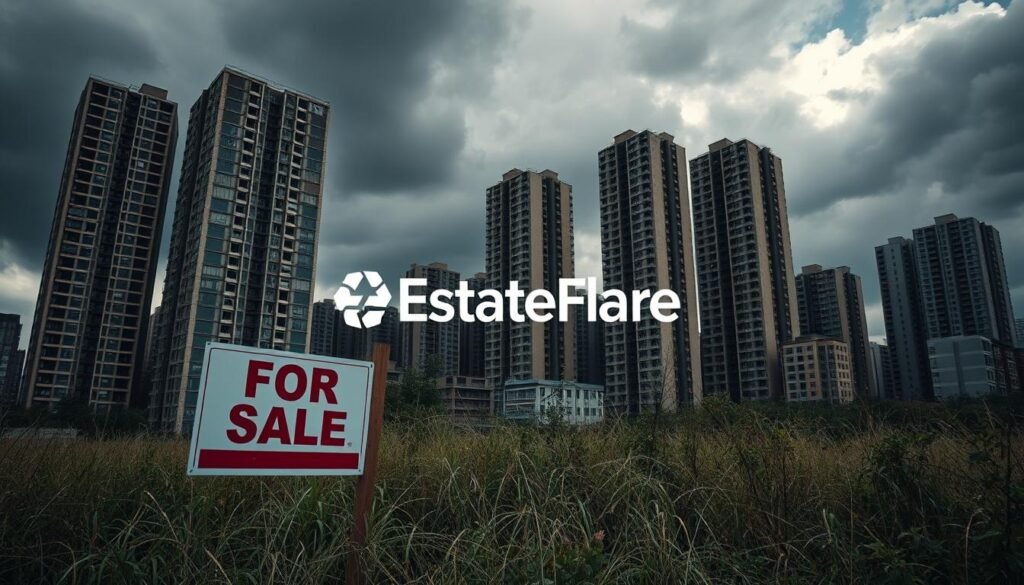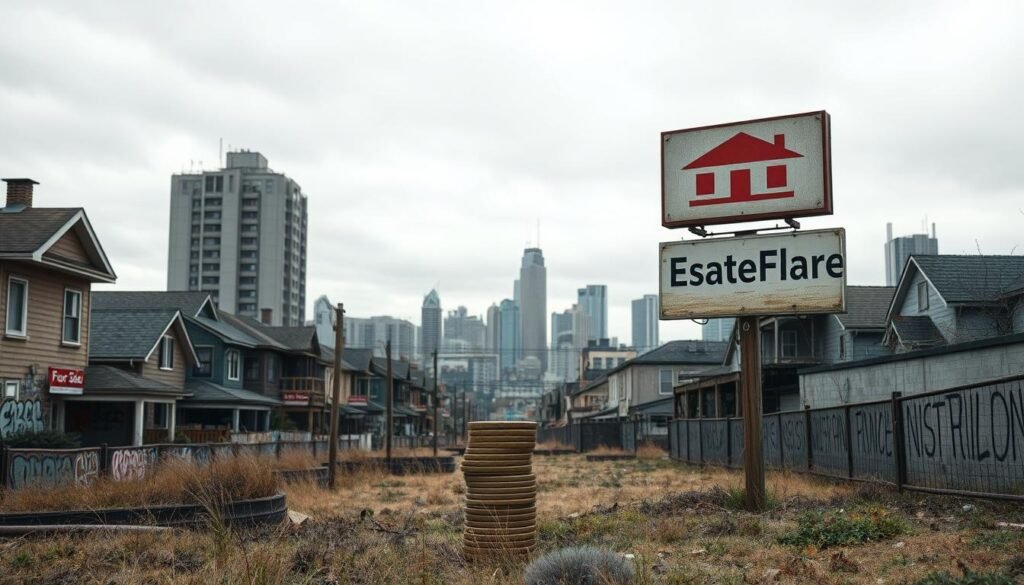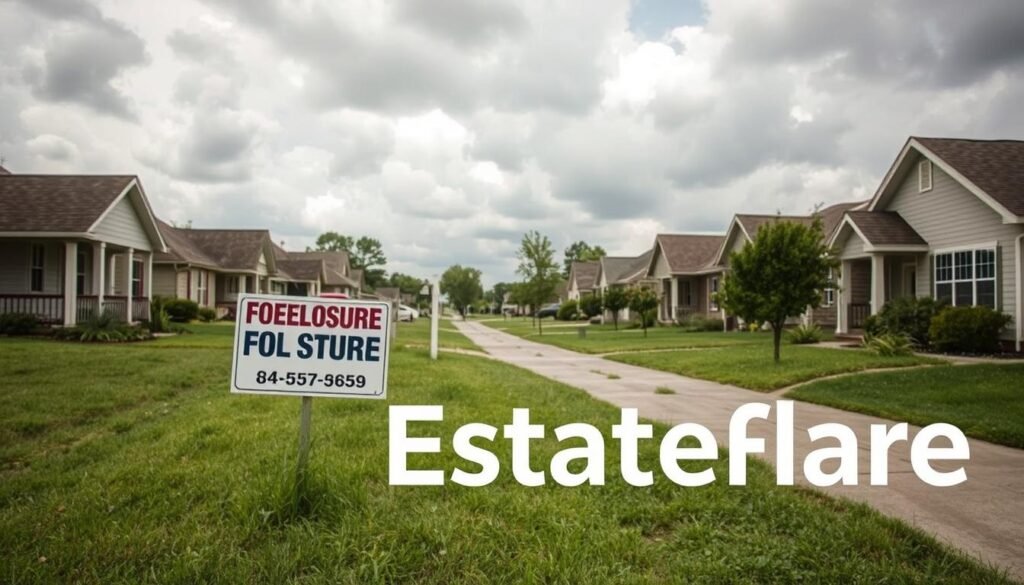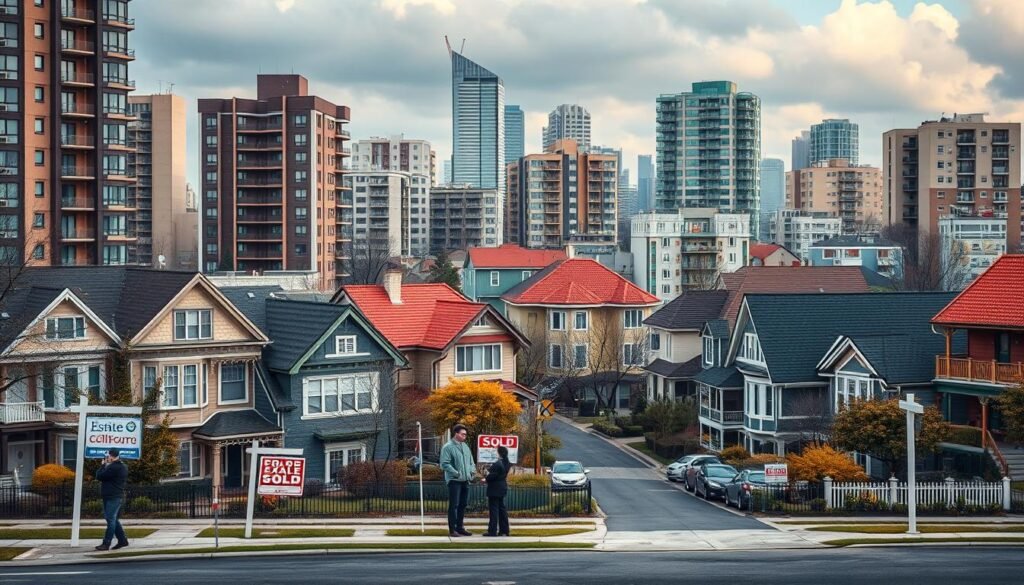Imagine a 15% drop in US home prices over the next two years. Economists warn this could signal the End of housing bubble. The housing market, still recovering from the subprime mortgage crisis, might soon see a big change.
In this article, we’ll look at the US housing market’s current state. We’ll check key indicators and expert opinions. We’ll see if the housing bubble’s end is near. Factors like rising interest rates and falling affordability could lead to a big change. This could affect homeowners, investors, and the whole economy.
Key Takeaways
- The US housing market might see a big price drop, with experts predicting a 15% fall in two years.
- The effects of the subprime mortgage crisis and an economic recession are making the market unstable.
- Rising interest rates, falling affordability, and foreclosure crises could burst the housing bubble.
- A housing market downturn could hurt homeowners, investors, and the economy.
- It’s important to understand current trends and indicators in the housing market.
Understanding the Housing Market Cycle
The housing market is complex and always changing. Many factors influence its cycles. To understand today’s real estate market, we must look at past trends and patterns.
Historical Patterns and Trends
The housing market has seen ups and downs over the years. Looking at historical data helps us understand these changes. Factors like interest rates and demographic shifts play big roles in these changes.
Factors Influencing Housing Prices
Many things affect home prices in the U.S. Interest rates, the economy, supply and demand, and government policies are all important. Knowing how these factors work together helps us predict the future and make smart choices.
| Factor | Impact on Housing Prices |
|---|---|
| Interest Rates | Higher interest rates make mortgages less affordable. This can lead to lower demand and prices. |
| Economic Conditions | Good economic times and jobs often mean more people want to buy homes. This can drive prices up. |
| Supply and Demand | When there’s not enough homes for buyers, prices can go up. The opposite can also happen. |
| Government Policies | Rules like tax breaks and zoning laws can affect the housing market. They can influence prices and conditions. |
Understanding the housing market cycle and its factors helps us navigate today’s real estate. It guides us in making choices about our homes and investments.
Signs of a Bursting Housing Bubble
The real estate market is showing worrying signs. It looks like the housing bubble might burst soon. These signs tell us a lot about what’s happening in the industry.
One key sign is the slowdown in home price increases. For a long time, prices went up fast. But now, they’re growing slower in many places. This means buyers are getting more careful and less eager to bid high.
Another sign is fewer buyers looking for homes. There are fewer people wanting to buy, leading to fewer sales and more competition for homes. This change in how people feel about buying homes is a big warning sign.
Also, the market is getting tougher. Mortgage rates are going up, and homes are less affordable. This makes it hard for many people, especially first-time buyers and those with lower incomes, to afford homes. This hurts the whole housing market.
| Indicator | Trend | Implication |
|---|---|---|
| Home Price Appreciation | Slowing | Cooling Demand |
| Buyer Demand | Decreasing | Reduced Sales Volume |
| Mortgage Rates | Rising | Declining Affordability |
These signs together suggest the housing bubble might burst soon. This could mean a big change in the real estate market. It’s important to keep up with these changes to make smart choices.

Impact of Rising Interest Rates
The housing market is facing big changes with rising interest rates. These changes affect how easy it is to get a mortgage. This makes it harder for people to buy homes.
Mortgage Affordability Concerns
When interest rates go up, borrowing money for a home costs more. This means monthly payments can be tough for many to handle. Some might struggle to get a mortgage or need to change their plans to afford it.
- Higher mortgage payments can hurt household budgets. It makes saving for a down payment or other expenses harder.
- First-time homebuyers might find it tough to afford homes. This is because they have less money to spend.
- This could slow down home sales. It might also make people want to buy homes less. This affects the whole market.
As interest rates keep going up, it’s important to watch how this affects mortgage affordability. The housing market will face big challenges because of this.
“The impact of rising interest rates on mortgage affordability is a critical factor that homebuyers and the housing industry must closely monitor.”
Declining Housing Affordability
The American housing market is facing a big problem – homes are becoming less affordable. Income levels are not keeping up with the rising cost of housing. This makes owning a home a distant dream for many across the country.
Income Levels and Housing Costs
A recent study showed that the median home price in the U.S. has gone up nearly 50% in five years. This is much faster than household incomes have grown. The gap between what homes cost and what people earn is growing. This makes it hard for people to buy a home.
First-time homebuyers and low-to-middle-income families are hit the hardest. They struggle to save for a down payment and get a mortgage they can afford.
The National Association of Realtors says first-time homebuyers have dropped from 40% to 31% in recent years. This is because they can’t afford to enter the market.
| Year | Median Home Price | Median Household Income | Affordability Index |
|---|---|---|---|
| 2017 | $247,800 | $59,039 | 155.0 |
| 2022 | $374,900 | $67,521 | 124.2 |
The decline in housing affordability affects not just buyers but the whole market and economy. With fewer people buying homes, more will rent. This could lead to higher rents and make the affordability crisis worse.

Subprime Mortgage Crisis Revisited
The subprime mortgage crisis has left a lasting impact on the housing market. Its effects are still felt today. It’s crucial to understand how predatory lending practices contributed to this disaster.
The crisis was fueled by high-risk, subprime loans given to vulnerable groups. These loans had high fees, adjustable rates, and little credit checks. This led to a huge increase in foreclosures and a drop in housing prices.
| Metric | Impact |
|---|---|
| Foreclosure Rates | Increased by over 200% during the crisis |
| Housing Prices | Declined by an average of 30% nationwide |
| Subprime Mortgage Volume | Grew from $35 billion in 1994 to $1 trillion in 2006 |
The crisis didn’t just hurt the housing market. It also affected the whole economy. Falling home values and rising foreclosures led to less spending and lower confidence. This caused a recession that hit many industries.
“The subprime mortgage crisis was a perfect storm of greed, recklessness, and a lack of regulation – a crisis that could have been avoided if we had learned the lessons of the past.”
Looking back, we see the dangers of predatory lending. We must remember these lessons to build a better housing market. A market that values homeowners and the community’s well-being.
Foreclosure Rates and Their Implications
The housing market is facing tough times, with foreclosure rates going up in many areas. This issue affects not just homeowners but also the whole community and the economy.
Neighborhood Blight and Economic Consequences
When homes are foreclosed, they often become run-down. This creates “neighborhood blight.” Such homes attract crime, lower property values, and scare off investors. This can hurt the local economy and reduce funds for public services.
The effects of more foreclosures are big. They can lead to:
- Less spending by families under financial stress
- Lower demand for housing-related goods and services
- More strain on social services and government help for displaced families
| Metric | 2019 | 2020 | 2021 |
|---|---|---|---|
| Foreclosure Rates | 0.47% | 1.12% | 2.05% |
| Neighborhood Blight Index | 3.2 | 4.5 | 6.1 |
| Economic Growth Rate | 2.9% | -0.3% | 1.2% |
Knowing the effects of rising foreclosure rates helps leaders find ways to help. They can support homeowners and neighborhoods in trouble.

Home Price Decline: A Reality Check
Many are worried about a big drop in home prices as the housing market corrects. The fear of a housing bubble bursting is real. But, we need to look at the facts to understand what might happen.
Recent data shows the home price decline might not be as bad as some thought. The housing market correction is happening, but prices are not falling sharply. This suggests a more gradual change in the real estate market conditions.
Several things are helping to keep the outlook more optimistic. Demand for homes is still strong. This is because of growing populations, more households, and a desire to own a home. This demand can help soften the effects of rising interest rates and other market changes.
- Affordability challenges: Even if home prices drop, rising mortgage rates might make homes less affordable. This could be a problem for people looking to buy.
- Inventory levels: There are fewer homes for sale, thanks to the last housing boom. This limited supply can help keep prices somewhat stable.
- Regional variations: The housing market correction will affect different areas differently. Some places might see bigger price drops than others.
The idea of a home price decline is not a certainty. How much prices will fall depends on many things, like the economy, policies, and how people act. Still, understanding the market well can help everyone involved make better decisions.
“The housing market is undergoing a necessary adjustment, but the extent of the home price decline may not be as severe as some have predicted. Maintaining a balanced perspective is crucial as we navigate this transition.”
End of housing bubble
The housing market is changing, and many think the end of the housing bubble is near. This change affects homeowners, investors, and the real estate world. We’ll look at signs the bubble might burst and what the future holds for real estate.
Rising interest rates are a big sign the bubble is ending. The Federal Reserve’s rate hikes make mortgages harder to get. This slowdown in demand is pushing home prices down.
Also, homes are less affordable now. High prices and steady incomes make it tough for new buyers. This could change the real estate scene, affecting everyone involved.
Understanding the end of the housing bubble is key. Homeowners, investors, and officials need to be ready. Knowing the risks and opportunities helps us all move forward.
“The bursting of the housing bubble is not just a financial event; it has far-reaching social and economic consequences that must be carefully considered.”
As the real estate market changes, keeping up with trends is vital. Knowing what’s happening with the end of the housing bubble helps us face challenges and find opportunities.
Economic Recession and Real Estate Market
The real estate market is closely linked to the economy. When the economy goes into recession, the housing sector feels it too. This creates a chain reaction in related industries. It’s important to grasp this to understand the real estate market’s challenges.
Ripple Effects on Related Industries
When the economy shrinks, many industries tied to real estate suffer. This includes construction, home improvement, mortgage lending, and real estate services. These sectors often see a big drop in activity when the housing market does.
The construction industry might see fewer new homes and less renovation work. This can lead to job losses and lower demand for building materials. Mortgage lenders could face more defaults and foreclosures, hurting their profits and operations.
| Industry | Potential Impact |
|---|---|
| Construction | Decreased new housing starts, reduced home renovations |
| Mortgage Lending | Increased delinquencies and foreclosures |
| Real Estate Services | Fewer home sales and rental transactions |
| Furniture and Appliances | Decreased demand for home furnishings and appliances |
The economic fallout from these effects can be huge. It could lead to more job losses, less spending by consumers, and more stress on the economy.
Understanding the economic recession’s impact on real estate is key. We must see how these industries are connected and how problems can spread. By tackling these issues, we can better face the challenges ahead and build a stronger future.
Navigating the Housing Market Downturn
The housing market is facing challenges, and everyone needs to adjust. [https://www.housingwire.com/articles/you-survived-2008-you-can-conquer-2024-navigating-a-changing-real-estate-landscape/] Knowing the signs of a housing bubble and how interest rates affect us is key. This way, we can find chances and avoid risks.
For those looking to buy, focus on what you can afford. Keep an eye on how mortgages and homes are becoming less affordable. Being ready to act fast can help you stand out in a changing market.
Sellers need to be realistic about prices dropping. They should look at foreclosure rates and how they might affect neighborhoods. This helps them price their homes right and sell them well.
Real Estate Investment Opportunities
Investors can find great deals in a downturn. By watching the economy and its effects on other industries, they can find hidden gems. This way, they can make the most of the market’s changes.
| Homebuyers | Sellers | Investors |
|---|---|---|
|
|
|
By adjusting their plans and seeing the downturn’s challenges and chances, everyone can get through it. Homebuyers, sellers, and investors can come out stronger on the other side. Check out the housing market downturn for more insights.
“The key to success in a housing market downturn is adaptability, resilience, and a willingness to seize new opportunities.”

Lessons Learned from Previous Crashes
The real estate market is getting ready for a possible downturn. It’s important to look back at past crashes for lessons. These insights can help us deal with market ups and downs better.
Preparing for Future Market Cycles
One big lesson from past crashes is to be ready for market changes. Real estate experts should watch economic signs and trends closely. This way, they can spot problems early and adjust their plans.
- Diversify investment portfolios to mitigate risk
- Maintain a healthy financial cushion to weather market fluctuations
- Prioritize long-term sustainable growth over short-term gains
The subprime mortgage crisis taught us the value of careful lending. Making sure mortgages are affordable and reducing default risks is key. This can prevent the high foreclosure rates we saw before.
Also, past crashes show how crucial clear communication and teamwork are. Real estate pros and policymakers working together can tackle market issues. This helps build trust in the housing market again.
“The only way to make sense out of change is to plunge into it, move with it, and join the dance.”
– Alan Watts
As the real estate market faces today’s challenges, learning from the past is vital. It helps us get ready for the future and handle the industry’s ups and downs.
Restoring Confidence in the Housing Market
The housing market is cooling down, with fewer construction projects. It’s key to restore confidence and tackle the problems. Policymakers and industry leaders must work together. They need to provide stability for homebuyers and sellers.
Rising interest rates make mortgages harder to get. Improving affordability can help. This includes adjusting lending rules or finding new ways to finance homes. Also, fixing the subprime mortgage crisis and lowering foreclosure rates are crucial.
The government and industry have big roles to play. Strategic interventions from policymakers are needed. Industry leaders must adapt to the changing market. Together, they can boost confidence and ensure the housing market drives economic growth.
| Intervention | Government Role | Industry Role |
|---|---|---|
| Mortgage Affordability | Adjust lending criteria, explore alternative financing options | Develop innovative products, provide flexible terms |
| Subprime Mortgage Crisis | Implement policies to address foreclosure rates, prevent future crises | Adopt more stringent underwriting standards, enhance transparency |
| Sustainable Growth | Provide tax incentives, invest in infrastructure | Adapt business models, invest in technology and innovation |
By working together, we can restore confidence in the housing market. This will ensure its stability and growth. It benefits everyone, from homebuyers and sellers to the whole economy.

“Restoring confidence in the housing market is a crucial step towards economic recovery and growth. It requires a concerted effort from policymakers, industry leaders, and the public to address the underlying challenges and create a more stable and accessible housing environment.”
HIGH DEMAND FOR RENTAL HOUSING: BUT SUPPLY IS FALLING
Conclusion
Reflecting on the housing bubble in the US, we see a complex market. The signs of a market distorted by financialization, fraud, and unsustainable prices are clear. This could lead to a market correction and economic troubles.
Housing prices have grown far from what people can afford, driven by subsidies, low interest rates, and speculation. If the bubble bursts, it could cause home values to drop, increase foreclosures, and lead to blight in communities.
Looking ahead, restoring confidence in the housing market is crucial. It will need a change in policies and practices that led to the bubble. By tackling the bubble’s causes, we can move towards a more sustainable and fair housing market. One that focuses on community needs, not just financial gains.



